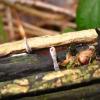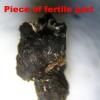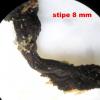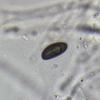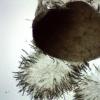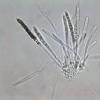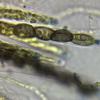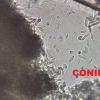
07-02-2026 20:30
 Robin Isaksson
Robin Isaksson
Hi!Anyone that have this one and can sen it to me?

25-01-2026 23:23
Hello! I found this species that resembles Delitsc

05-02-2026 15:07
Found on a fallen needle of Pinus halepensis, diam

05-02-2026 06:43
Stefan BlaserHello everybody, Any help on this one would be mu

18-08-2025 15:07
 Lothar Krieglsteiner
Lothar Krieglsteiner
.. 20.7.25, in subarctic habital. The liverwort i

02-02-2026 21:46
Margot en Geert VullingsOn a barkless poplar branch, we found hairy discs

02-02-2026 14:55
 Andgelo Mombert
Andgelo Mombert
Bonjour,Sur thalle de Lobaria pulmonaria.Conidiome

02-02-2026 14:33
 Andgelo Mombert
Andgelo Mombert
Bonjour,Sur le thalle de Peltigera praetextata, ne
Found on a fallen branch of oak. The wood is colored black and the stromata has a stipe of 8x1 mm and a fertile part of 11x2.5 mm. The outer crust is hard and black with grey patches and lumpy as a result of the underlying perithecia.
TELEMORPHE:
Perithecia: subglobose 514 x 400 µm
Asci: cylindrical 124-158 x 8-9,65 µm
Paraphyses: filiform
Spores: 11,35-13,37 x 5,14-5,94 µm Q= 2.23 with straight germsplit (spore lenght 11.2 µm with germsplit length 7.85 µm)
ANAMORPHE: flat length 5-8 mm; conidia:10,41-16,3 x 3,02-3,86 µm
Macroscopic/microscopic this frb looks like Xylaria arbusula except the length of the asci is wrong and I found it in Belgium/Turnhout in winter! Is this not a tropical asco?
I will be grateful for your help!
Greetings,
François Bartholomeeusen

your images do not allow an identification.
Before considering X. arbuscula you should rule out X. hypoxylon. The key feature distinguish them is the thickness and texture of the outer crust. See my notes in the monographic keys available on Ascofrance.
Good luck,
Jacques
I have made the wrong choice at step 2 of your superb key. I chose "Stromata hard-textured with a carbonaceous outer crust".
Perhaps the persistent, drying east wind, the sun and the freezing temperature changed the texture a bit? In all cases reading your notes has shed light on my problems. I have also measured the out crust and is was about 40-45 µm thick.
Thank you for your quick reaction!
Cordial greetings,
François

